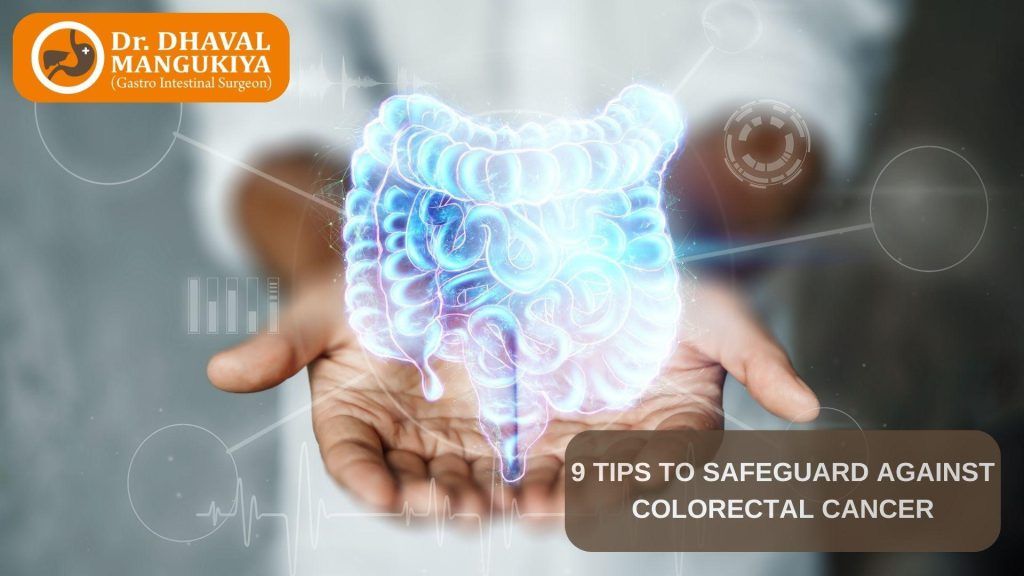Colorectal cancer is a significant health concern, but there are proactive steps you can take to reduce your risk. Dr. Dhaval Mangukiya being one of the best colon cancer surgeons in Surat has come up with these nine essential tips to help prevent colorectal cancer. By implementing these strategies into your lifestyle, you can take charge of your health and lower your risk of this potentially devastating disease.
1. Maintain a Healthy Weight:
Strive to maintain a healthy weight through regular physical activity and a well-balanced diet. Excess weight, particularly around the waistline, is linked to an increased risk of colorectal cancer. Focus on incorporating fruits, vegetables, whole grains, and lean proteins into your meals while limiting processed foods and sugary beverages.
2. Adopt a Fiber-Rich Diet:
Include fiber-rich foods in your daily diet, such as whole grains, fruits, vegetables, and legumes. Dietary fiber plays a crucial role in promoting regular bowel movements and maintaining a healthy digestive system. Aim for at least 25–30 grams of fiber per day to reduce the risk of colorectal cancer.
3. Limit Red and Processed Meat Consumption:
Excessive consumption of red meat (such as beef, pork, and lamb) and processed meats (such as sausages, bacon, and deli meats) has been associated with an increased risk of colorectal cancer. Instead, opt for lean protein sources like fish, poultry, and plant-based proteins.
4. Be Physically Active:
Engage in regular physical activity for at least 150 minutes per week. Physical exercise, such as brisk walking, cycling, or swimming, helps maintain a healthy weight, improves digestion, and reduces the risk of colorectal cancer. Find activities you enjoy and make them a part of your daily routine.
5. Quit Smoking:
Smoking is a known risk factor for various types of cancer, including colorectal cancer. If you’re a smoker, take proactive steps to quit smoking. Seek support from healthcare professionals, join smoking cessation programs, and explore nicotine replacement therapies to increase your chances of success.
6. Limit Alcohol Consumption:
Excessive alcohol consumption has been linked to an increased risk of colorectal cancer. If you choose to drink alcohol, do so in moderation. Women should limit themselves to one drink per day, while men should limit themselves to two drinks per day.
7. Get Screened Regularly:
Screening for colorectal cancer is vital, even if you’re not experiencing any symptoms. Regular screening can detect precancerous growths or early-stage cancer when treatment is most effective. Consult with the best gastro surgeon in Surat to determine the most appropriate screening method for your age and risk profile.
8. Prioritize Vitamin D:
Maintaining adequate levels of vitamin D may help lower the risk of colorectal cancer. Spend time outdoors, particularly in sunlight, which is a natural source of vitamin D. If necessary, consider taking vitamin D supplements after consulting with your healthcare provider.
9. Understand Your Family History:
Know your family history of colorectal cancer and discuss it with your healthcare provider. If you have close relatives who have had the disease, you may be at a higher risk. Your doctor can guide you regarding appropriate screening intervals or additional preventive measures based on your family history.
Conclusion:
Preventing colorectal cancer requires a proactive approach to health and lifestyle choices. By maintaining a healthy weight, adopting a fibre-rich diet, engaging in regular physical activity, and making smart choices regarding meat consumption, alcohol, and tobacco, you can significantly reduce your risk. Additionally, getting screened regularly, prioritizing vitamin D, and understanding your family history play important roles in preventive care.
However, consulting the best stomach surgeon in Surat for colorectal cancer treatment is crucial as soon as you experience any concerning symptoms or if you fall into specific high-risk categories. Here are some situations when you should seek medical attention:
● Symptoms such as unexplained diarrhoea or constipation, blood in your stool, abdominal pain or discomfort, unexplained weight loss, or fatigue
● If you have a family history of colorectal cancer or certain genetic conditions that increase your risk
Regular screening for colorectal cancer is recommended for individuals aged 45 and above, or earlier if you have risk factors or a family history. Remember, taking charge of your health today can pave the way for a brighter and cancer-free future.

